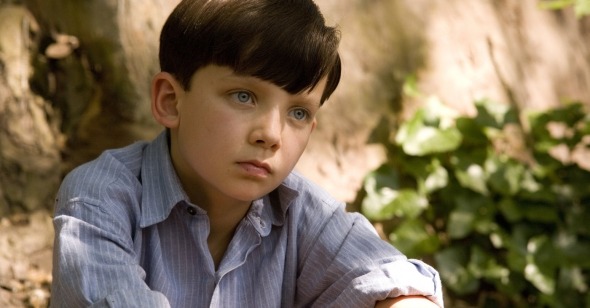The Other Side of the Fence
by Michael Joshua Rowin
The Boy in the Striped Pajamas
Dir. Mark Herman, UK/USA, Miramax
For a little, promising while, The Boy in the Striped Pajamas seems to be a welcome, if belated, response to Life Is Beautiful. Whereas Roberto Benigni’s self-deifying exercise in Holocaust schmaltz—one of the most repugnant and false movies ever made—sincerely believes obliviousness (not imagination, as its defenders claim) can shield the innocent from horror, Mark Herman’s film understands this is not only impossible, but that any attempt to do so is unconscionably insulating and opposed to developing human awareness. Benigni’s coddling, regressive approach toward reality deserves to be combated, but The Boy in the Striped Pajamas succeeds as a corrective for only so long until a manipulative and wrongheaded ending completely undoes everything Herman, the British director of Brassed Off and Little Voice, has worked toward.
As in much of Life Is Beautiful, The Boy in the Striped Pajamas (both are Miramax films, it must be mentioned) witnesses the Holocaust from the point of view of a child, here eight-year-old Bruno (Asa Butterfield), the German son of a loving mother (Vera Farmiga) and a cold Nazi officer (David Thewlis, imbuing a likely caricature with multiple dimensions). Life is indeed beautiful until Bruno’s family moves from Berlin to a depressing rural patch in the middle of nowhere on which their new property neighbors a less than inconspicuous concentration camp. Not quite comprehending why the people he spies from his bedroom window wear “striped pajamas,” Bruno is kept ignorant of the truth by his parents, who tell him the death factory is a farm.
The “farm” is father’s new commanding post, and The Boy in the Striped Pajamas depicts with impressive psychological detail how each member of the family reacts to the enormous elephant just across the way: Vater sees it as a necessary arm of the Reich; Mutter goes from ignorance to outrage upon learning its true function; Bruno’s older sister, Gretel (Amber Beattie), a budding Hitler Youth, accepts Jew-slaying to be a natural punishment for the race of “vermin”; and Grandma (Sheila Hancock) retains her staunchly anti-Nazi politics, alienating herself from the rest of the family. Herman, adapting a novel by John Boyne, pays close and discomforting attention to a family dynamic slowly eroding under futile bourgeois suppressions of the industry upon which their posh societal standing rests. In Thomas Mann–like fashion, the parents separate, the sister isolates herself in hate, and the grandmother dies alone.
At the same time, Bruno begins to understand what’s going on, at least partially, when he sneaks away from his dysfunctional household and befriends Shmuel (Jack Scanlon), a young boy of the same age living behind the barbed wire of the camp. Despite the film’s icky tag line, “Lines may divide us, but hope will unite us,” there’s not much hope in this scenario. Bruno and Shmuel find the bare minimum amount of fun they can with an electric fence between them, but Bruno disavows sneaking Shmuel food when questioned by a Nazi soldier. To make up for his act of cowardice, Bruno elects to help Shmuel search for his missing father in the concentration camp.
Unfortunately, this is where The Boy in the Striped Pajamas loses its grip as a realistic drama about the loss of innocence and the development of individual moral responsibility—the total opposite of Life Is Beautiful—and becomes something emotionally crass and exploitative. (Major spoilers ahead!) As Bruno and Shmuel search, the two are rounded up with a group of adults to be sent to the gas chamber. Bruno’s parents realize what has happened and the father tries to stop the mass extermination, but it’s too late. Bruno’s death is the tragic, ironic capper to this tale of indiscriminate evil, but what of Shmuel? If he died alone would the film be less tragic? What of the other Jews? Were their deaths just a backdrop until the intrusion of an adorable Aryan boy made them real? Going against everything that would make it derivative of Life Is Beautiful, most of The Boy in the Striped Pajamas is surprisingly unsentimental and sober enough to put off complete denouncement of its intentions; but the ending raises questions serious enough to make one reconsider.
